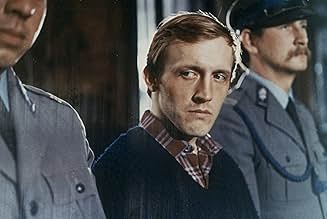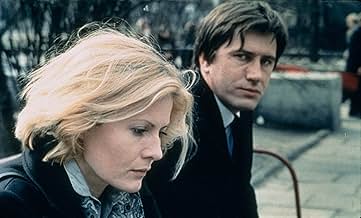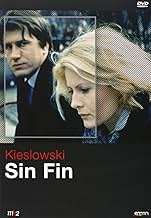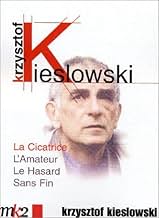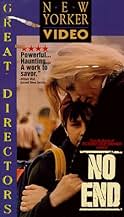IMDb RATING
7.3/10
6.1K
YOUR RATING
The wife of the recently deceased lawyer tries to cope with grief after his loss and to keep his last case going in court.The wife of the recently deceased lawyer tries to cope with grief after his loss and to keep his last case going in court.The wife of the recently deceased lawyer tries to cope with grief after his loss and to keep his last case going in court.
- Director
- Writers
- Stars
Danny Webb
- American
- (as Daniel Webb)
Jacek Domanski
- Dzialacz opozycji
- (uncredited)
- Director
- Writers
- All cast & crew
- Production, box office & more at IMDbPro
Featured reviews
I state for the record that I did not understand this film fully. The second plot with Solidarnost protester imprisoned and released by the court is not completely clear to me. Yet it has little to do with politics and more with human condition (ideals, expectation, compromise). Prisoner's family doesn't react happily upon his immediate release in a court room. There is awkwardness and embarrassment in that scene, as if some unforgivable compromise has been made and it tainted all of their relationship. Accident scene with a death of motorist seems random but reoccurring theme in Kieslowskij movies. Randomness of death, randomness of existence. Movie is wonderfully shot , music (as always) is haunting. I just cannot put it all together in my mind like I could with Veronique.
I've began to follow Kieslowski over the past days, hoping to finally encounter his color films which I've seen for years pop up among the brilliant works. I watched this as background glimpse into his formative period. Interestingly he does two things:
One is he presents a world that has come undone and carries the past. A woman, her husband has died as the film begins, life has broken down and she has to go out and face it. Everything that she encounters is an echo from the past. Two instances that involve photos exemplify it; nude photos of her that her husband had found but he's now gone before she had a chance to explain, the other shows an idyllic summer that he possibly spent with another woman (before they met?). But also an old friend who now vies for her, a night of prostituting herself because he reminds her of her husband, being hypnotized to forget him conjures his presence, and round it goes from bewilderment to epiphany.
The other thing they do here is look to frame a response to bewilderment felt by Poles who had just been through strikes and martial law. A man is awaiting trial, different narratives are offered up by lawyers. Should he be pragmatic or protest? It's one of the threads that were left undone at the time of the husband's death who was a lawyer on the case. His own advice, which I perceive to be Kieslowski's, is for everyone to remove the distortions that prevent them from seeing each other.
Viewers who are content to encounter a life of episodic confusion will be happy with what he does. I miss a more penetratingly visual way of threading these events and, already from my brief glimpses into Dekalog, I believe it's this ability to surround and submerge causality that he's going to cultivate, a way of dreaming in advance. Here, tellingly, we have the husband announcing his own death in the very first shot whereas it could have been threaded as discovery and glimpsed in a haze (he already tries this by the first episode of Dekalog).
One is he presents a world that has come undone and carries the past. A woman, her husband has died as the film begins, life has broken down and she has to go out and face it. Everything that she encounters is an echo from the past. Two instances that involve photos exemplify it; nude photos of her that her husband had found but he's now gone before she had a chance to explain, the other shows an idyllic summer that he possibly spent with another woman (before they met?). But also an old friend who now vies for her, a night of prostituting herself because he reminds her of her husband, being hypnotized to forget him conjures his presence, and round it goes from bewilderment to epiphany.
The other thing they do here is look to frame a response to bewilderment felt by Poles who had just been through strikes and martial law. A man is awaiting trial, different narratives are offered up by lawyers. Should he be pragmatic or protest? It's one of the threads that were left undone at the time of the husband's death who was a lawyer on the case. His own advice, which I perceive to be Kieslowski's, is for everyone to remove the distortions that prevent them from seeing each other.
Viewers who are content to encounter a life of episodic confusion will be happy with what he does. I miss a more penetratingly visual way of threading these events and, already from my brief glimpses into Dekalog, I believe it's this ability to surround and submerge causality that he's going to cultivate, a way of dreaming in advance. Here, tellingly, we have the husband announcing his own death in the very first shot whereas it could have been threaded as discovery and glimpsed in a haze (he already tries this by the first episode of Dekalog).
This is an excellent film and a great discovery. It's from about ten years before The Double Life Of Veronica and the Three Colours trilogy and is, it its way, equally good. It almost certainly inspired Truly, Madly, Deeply because the main story is about a young lawyer, Antek Zyro (Jerzy Radziwilowicz) who tells us at the outset that he is dead and spends the remainder of the film watching over his widow and young son. Grazyna Szpapolowska is outstanding, not to say beautiful, as the widow who 'feels' her husband everywhere and tries a variety of remedies - hypnosis, casual sex - to dispel his presence all to no avail. It's a stunning film shot in muted blue tones throughout and well worth a visit. 9/10
Although there is the obvious plot of the grieving wife, the movie is really about Poland under martial law. Probably unable to directly focus on such political topics, Kieslowski attempts to 'hide' this other side beneath a twisted Ghost subplot.
A dark movie, one that demands attentive viewing, this one will probably never be as successful as some of Kieslowski's other works, which have probably led its viewers to pick up this one.
A dark movie, one that demands attentive viewing, this one will probably never be as successful as some of Kieslowski's other works, which have probably led its viewers to pick up this one.
Mesmerising, if only for the performance by Grazyna Szapolowska as the widow who moves through the film and ignites every scene. Beautiful and tragic at once she emanates power over the audience and one cannot turn away. I had not realised how much this film must have influenced some established mainstream films that we assume to be original. Obviously many of them owe a great debt to this story. Told unflinchingly by Kieslowski in a unshowy manner it still demonstrates moments of brilliant insights into the human condition. The pain and torture we must endure after such heartache runs through the the heart of this film. I particularly liked the little moments as always, such as the glass slipping through her fingers, the dog trying to get in the car, the dirt on her hands from the bumper whilst witnessing the accident, the hypnotherapy session where she sees him. All simple and yet so elegant. No hammering it through to the audience with big signposting saying 'Remember this for later!'. Why don't more films treat the audience with a tiny bit more intelligence or is the majority of film going to assume we are all thick. And just because a film is mainstream doesn't mean it has to be low brow. Godfather, Deer Hunter, French Connection? Very strong films? If you see this also see Amator.
Did you know
- TriviaThe film takes place in 1982.
- Quotes
[First lines]
Antek Zyro: [speaking directly to the camera] I died - four days ago.
- How long is No End?Powered by Alexa
Details
- Release date
- Country of origin
- Languages
- Also known as
- No End
- Filming locations
- Bródno, Targówek, Warsaw, Mazowieckie, Poland(car accident scene)
- Production company
- See more company credits at IMDbPro
Contribute to this page
Suggest an edit or add missing content

